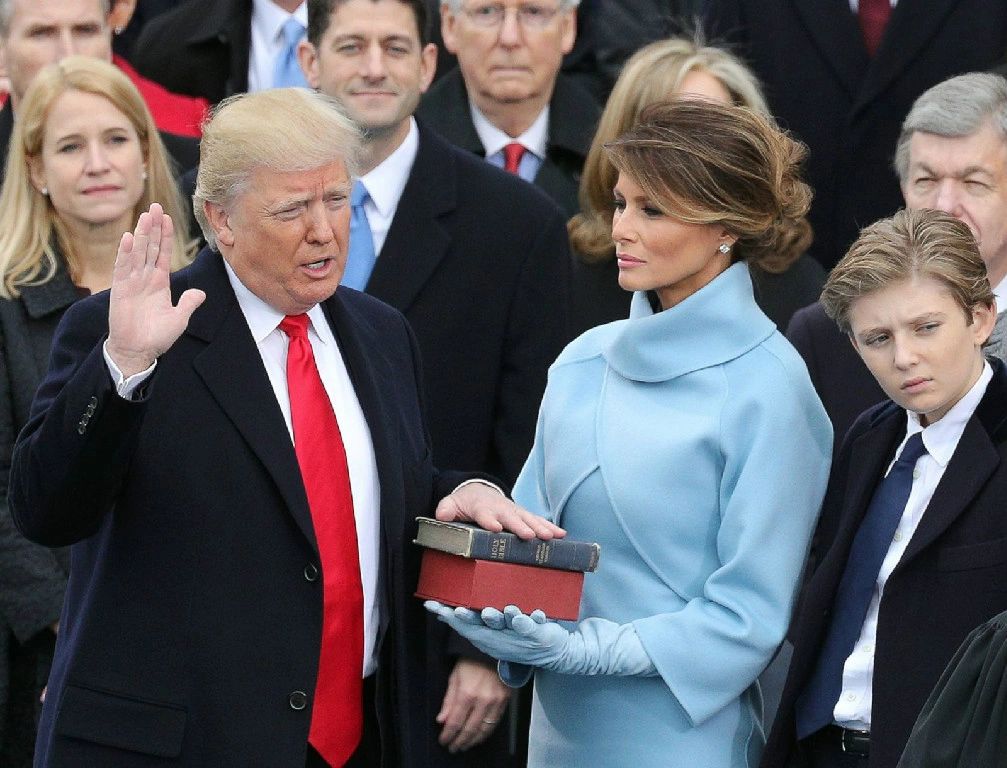
- Home Page
- INL_WorldNewsSummary1
- INL_WorldNews_Summary2
- INL_News_Features1
- INL_Movie_News
- June_July07_News
- June_JulyA_07_News
- JUne_July0_NewsC
- BabyBlackSwanStudy
- MollyMeldrum_M_Gudinski
- Ellen_DeGeneres_TV_Show
- WorldVideoNews_Oct07
- WorldNews_June-July07D
- World_News_Nov_2007
- Bridget's_Daily_TV_Squad
- Mooly_Bloom_James_Joyce
- Guestbook
- YouTube_VideoClips1
- My_Space-The_Musical
- InternationalTheatreShow
- USA_Weekly_News_History1
- USA_Weekly_News_History2
- NewYork_What'sNew_Views
- NewYorkTimesSquare_WebCa
- SanFranciso-What's-On
- Freemasonry?_History
- Live_Leake_Great_Videos
- Rupert_Murdoch_MediaBarr
- AustNews_RealEstate
- Feature-Art_Work
- INLWorldNews_Dec08
- INLWorldNews_Jan09
- Canada_NPRNews
- EyeWitness_LocalNews
- USA_Video_News
- Business_News
- World_Video_News
- Entertainment_NewsP1
- Google's_Best_Videos
- End_Game_NewWorldOrder
- USA_2008_Elections
- CorruptPolice_Queensland
- WorldNewsHistory1
- Dublin_Fringe_Festival
- EdinburghFringe_Festival
- USAWeeklyNews_Awards
- Australian_Opera
- NewsHistory2008-P1
- WorldNewsHistory2008_P2
- WorldHistoryNews2008_P3
- WorldNewsHistory2008_P4
- WordlHistoryNews2008_P5
- Walter_Moreira_Salles
- RippOffClaims
- Phil_Spector_On_Trial
- BBC_Video_IPlayer_News
- DIANA_PRINCESSOFWALES
- USA_2008_ELECTIONS_P2
- WorldNews_Nov2008
- USA_News_November2008
- Obama_USA_President
- SCOTLAND'S_CRIMEGANGS
- MAG_Lloyds_HBOS_FIGHT
- LiverpoolFC_HicksGillett
- AustWeekendNews2001
- White_Gold_Cover_Up
- Iain_Gunn_Speaks_Out
- Liverpool_Football_Club
- Flickr_Christmas_Photos
- INL_SAUDI_ARABIA_NEWS
- BrokeBackMountain_Ledger
- Confucius_Quotations
- 72Point.com_Best_UKPR
- saddam_hussein_world
- INLNewsNewYear_2009
- BorisJohnson_LondonMayor
- Gaza_Israel_Hamas_War
- What Is_The_GazaStrip?
- World_Protests _Gaza
- Nov-December08News
- Photos_Israel _Gaza
- Gaza_Israel-ConflictNews
- INLNews_Jan_Feb_2009
- American_In_Gaza
- INLWorldNewsJan_Feb2
- BERRBusinessEnterpriseUK
- Gaza_Israel_Ceasefire
- USAWeeklyNews2007_08_P1
- Give Peace a Chance
- Yoko_Ono_Life Story
- John_Winston_Lennon
- Jonathan_Ross_BBC
- Russell_Brand
- Melbourne_2009BushFires
- INLNews_March09P2
- Dar_Williams_USAFolkRock
- INLNews_Hot_Topics
- INLMarch09News_P3
- INL_January09_News
- INLNewsJan_Feb2009_P2
- INL_MarchNews_P4
- INLNews_March09_P5
- INLNews_March09_P6
- INL News_March09_P7
- USA_IndependentMedia
- Bob_Dylan_Story
- NewYork'sEasterParade
- UnitedPeaceJusticeMarch
- Susan_Boyle_Singer
- INL_WorldNews_April09
- Naked_Ambition?
- Sabastian_Diaz_Director
- NightToRememberNewYork
- Lloyd_Carew-Reid_Justice
- FremantleMedia.com
- PippenDrysdale_FineArts
- INL's_Croatia_News
- Austin_Texas_News
- USA_Festival_Directory
- Diabetes_News
- MAY09_INLWorldNews
- MaliWomen'sPerformingArt
- INLNov08HistoryNews
- MichaelJacksonStory1
- MichaelJacksonMurdered?
- AmericanUnionMade?
- DeathofMichaelJackson2
- MichaelJacksonHistory3
- HottestWebNews
- TopMichaelJacksonNews1
- BloomergBusinessNews
- FansSuicideOverJackson
- MackennalEdgarBertram
- allmichaeljackson
- INLNewsMarch09P8
- INLNewsMarch09P9
- MichaelJacksonMurdered?2
- INLNewsMarch09P10
- RunningOfTheBulls
- MichaelJacksonVideoNews
- BBC_INLVideoNews
- AP_INLVideoNews
- Reuters_INLNewsVideo
- FOX _INLNewsVideo
- Fox_INLBusinessNews
- AFP_INL VideoNews
- Australia_INLNewsVideo
- CBC.ca_INLNewsVideo
- INLJuly09NewsP1
- INLNewsSept09
- BrookAstor_AnthonyAstor
- BNP_UK_NIckGriffin
- FindMadeleineMcCann.com
- WorldsMostPowerfulMen
- AdolfHitler_EvaBrownFilm
- MurdochToBuyBBCDebate
- MurdochSaysNoFreeNews
- MurdochToSueBBCForLosses
- ABCSlamsMurdochBBCAttack
- MurdochPapersOpenFireBBC
- GoogleMurdochDivorcing
- GoogleCorporateHistory
- MurdochBuyingUKElection
- MurdochBuyingUKElection
- UKWeeklyWorldNewsNov09
- INLWorldNewsDec2009
- INLWorldNewsNov2009
- BilderbergGroupHistory
- USAFreemasonPresidentsP1
- USA_PresidentsListP1
- USA_PresidentsListP2
- BilderbergGroupHistoryP2
- BilderbergGroupHistoryP3
- IlluminatiNewWorldOrder2
- IlluminatiNewWorldOrder4
- SurvivalOfElitePyramid
- CodexAlimentarius
- JFK_KennedyAssasination
- RothschildWorldControl1
- RothschildMurderHistory1
- WhoRothschildsMurdered2
- RothschildMoneyControl
- ObamaAntiChristIdentity
- RothschildsNewWorld2
- RothschildsNewWorld3
- RothschildsNewWorld4
- RothschildsNewWorld1
- RothschildsNewWorld2
- RothschildsNewWorld3
- RothschildsNewWorld4
- RothschildsNewWorld6
- WorldPressTVNewsJan2010
- RothschildsNewWorld5
- HitlerWasABritishAgent1
- WorldGovernmentAgenda1
- NWOPlanBankingCollapse1
- USA_Past-Present_Future1
- USA_Past-Present_Future1
- AdolfHitler_EvaBrownFilm
- WikiLeaksJulianAssange
- IlluminatiNewWolrdOrder1
- LeoZagami_RealIlluminati
- Leo_Zagami_Illuminati_P2
- Leo_Zagami_Illuminati_P3
- Leo_Zagami_Illuminati_P4
- Leo_Zagami_Illuminati_P4
- Leo_Zagami_Illuminati_P6
- Leo_Zagami_Illuminati_P7
- Nebra_Astronomical_Clock
- INLNews_DailyWorldNews_1
- PeterMoonAussieCommedian
- AllanBond_DiBliss_WAust
- Marie-Claire_Bleasdale
- DidThurmonHaveFairTrial?
- RebekahBrooks_Arrested
- MadeleineMcCann_NewProbe
- VisionWatchReports_2012
- WorldVisionReportsJune12
- Scotlands-IndepenceFight
- HiddenHIstoryOfLondonP_1
- MicklebergStitchWestAust
- WhyWasNickClayMurderedP1
- WhyWasSeanHoareMurdered
- WhoMurderedThomasAllwood
- YahooMoviesEntertainment
- Rebekah_Brooks_Arrested1
- CIASellDrugs_MediaLiesP1
- HiddenHistoryOfLondonP_2
- MrX_InsideFileDisclosure
- MrWijatsFav_GooglePhotos
- Assange_FearsMurderInUSA
- CovertDepopulationTactic
- WeaponizedWeatherExposed
- JapaneseEarthquakeDebate
- GiseldaBlanco_Concaine
- LakeAnnecyFranceShooting
- CyberCrimeCyberCriminals
- RocketKIlledUSAmbassador
- USCoversUpPolishMassacre
- FaceBookIsWatchingYouNow
- DuchessofCambridge_Kate
- Mash_Before&AfterPhotos
- AntiDepressantsNightmare
- JimmySavileBBCdiedAged84
- JimmySavile_GuradianNews
- RothschildsMossadMI5_CIA
- WhoIsZbigniewBrzezinski
- BillClintons_BodyCountP1
- RothschildsSpyAgenciesP1
- BushHadPrior911Knowledge
- SirFrancisBoyle_Lawyer
- GlobalResearchWarOnDrugs
- NATO_OperationGladio
- RothschildMI5SovietAgent
- Ostrovsky_WayOfDeception
- CatarinaMiglioriniBrazil
- ToKnow_InfiniteAwareness
- GaryGlitter_PaulGlad_BBC
- ObamaVRomney_USA_Debate2
- INLNewsHistory3rdOct2012
- DailyWorldNews_INLNewsP1
- ObamaWins2012USAElection
- ChrisSpiveyWorldPutRight
- NimbinMardiGrassParade
- ChippingAwayTheBullSh_t
- TheSecretTeamLeroyProuty
- HowTheCIAIsRunSecretTeam
- PaulaBroadwell_DPetraeus
- MikeMorrell-CIADirector
- INLNewsCIAKGBSpyPhotosP1
- AssassinationBigBusiness
- MaxwellFrankClifford
- SandyHookSchoolShooting
- WhoRunsTheUK_MI5_orThePM
- SchapelleCorby_SetUp_Why
- CIA_MindControl_MKULTRA
- ProjectPaperClip_NaziCIA
- MI6_GlobalDrugTradeLords
- HitlersNaziPsychiatrists
- CIASellsDrugsMediaLies
- TriumphOfTruthBookStolen
- CIAMI6ControlDrugDealing
- MontgomeryClan_Scotland
- WorldHungerScandal
- UnfilteredINLWorldNewsP1
- MeetPrudenceMurdoch
- IceAgeArt_BritishMuseum
- FLOURIDEandDEMOCRACY
- DialMForMurdoch_Hacking
- ForbesRichList-2013
- Oxford-LegalAncecdotes
- LeadBellyBlues1888to1949
- ScotlandsFreePressAtRisk
- ScotlandNewPoliceInChaos
- FutureSpaceSettlementsP1
- MegaFloods-PastandFuture
- GeorgeCarlinFamousQuotes
- HitlerWasABritish
- EarthPastFutureGlenKealy
- MargaretThatcherIronLady
- Lady_MargaretThatcher
- MadMagazine-History
- FreemasonHistoryExposed1
- INL_EntertainmentNews_P1
- CorruptionHighCourtJudge
- Freemason-TheBrotherhood
- BehindSecretClosedDoors
- Jabobite-MasonControlWar
- Lord_PatrickStewartHodge
- MostDangerousMen_History
- WoolwichAttack-LeeRigby1
- MI5-behindWoolwichMurder
- Woolwich-RigbyTerrorNews
- WhoReallyRunsTheWorld?
- Murdoch_WendiDengDivorse
- EdwardSnowden_CIA-Prism
- HowCIACreatedBinLaden-GL
- MI6PrincessDiannaMurder1
- PrincessDiana-MI6Murder
- LadyGaGa-IlluminatiQueen
- Psychiatry_DeathIndustry
- MurderOfPrincessDianaP1
- CorruptPoliceInAustralia
- DroneTechnology_Effects1
- EffectsOfDroneTechnology
- CorruptPolice_BlueMurder
- IndianFunnyBlogsPictures
- IndianInterestingStories
- WikiLeaks-MIrrors-Cables
- Assange-AustralianSenate
- PrinceGeorge_UKRoyalBaby
- LadyDieFilm_DianaMurder1
- EdFringe.com2013EdFringe
- EdFringe.com_2013Fringe2
- EdFringe.comJustTheTonic
- EdFringe.comAssembly2013
- EdFringe.comUnderbelly13
- WomenWhoWank_FoolishPlay
- UKLandRegistryCorruption
- SyriaConflict_IsWarRight
- MafiaWars_INLNews
- JusticeForRaymondMcCord4
- BulgarianMafia-InControl
- LenWalterBuckeridge_BGC
- ChineseTriadsInAustralia
- LenBuckeridgeDiesAged_77
- MoneyLaundering-Ireland
- HitlersWarMachine-Farben
- RothchildsWorldControl3
- MarkZuckerberg_Zuckerman
- MarinaKeeganDied-22Years
- TheDarkAlliance-GaryWebb
- MoneyChangersHistoryP1
- TriumphOfTruth-TheBookP1
- TheGreatAmericanNovel_P1
- TheGreatAmericanNovel_P2
- TheGreatAmericanNovel_P3
- BlueMurder_CorruptPolice
- ValerieVisitsMateraItaly
- arcticbeacon.com-radioP1
- arcticbeacon.com-radioP2
- Australian_Drug_Busts_P1
- DrsDie_ForSavingChildren
- NewAgeGlobalistAgenda_P1
- Page 372
- BCCI_Criminal_Network
- HillaryClintonReport_P.1
- USElection_TrumpVHillary
- ClaremontSerialMurdersWA
- ClaremontSerialKillings2
- WestAustralianElections
- DrKarlO'Callaghan-Police
- MafiaAustraliaDrugMurder
- DonaldTrump_USAPresident
- Gus_McCann_Irish_Singer
- JimMorrisonRidersInStorm
- Jim_Morrison_TheDoors_P1
- Khashoggi_Slaying_ News
- WestAustralianCorruption
- Storm_DocumentariesP1
- celebritieswhomarriedfan
- MostExpensiveProperties
- Expensivehomesforsale_P1
- MovieStarsWhoHatedtoKiss
- Google_Bias_Investigated
- Glen_Kealy_The Sculptor1
- JulianAssange_Arrest_P.1
- JulianAssangeSnowdenFile
- globalelitetvdocumentary
- AnnieJacobsen_USA_Author
- PerthMintSwindleTheMovie
- TheGreatAmericanNovel4
 Mr Wijat's friend Magic Rabbit
Mr Wijat's friend Magic Rabbit  http://www.easterlingentertainment.net
http://www.easterlingentertainment.netINLNews YahooMail HotMail GMail AOLMai
lUSA MAIL YahooMail HotMailGMail AOLMail MyWayMail CNNWorld IsraelVideoNs
INLNsNYTimes WashNs AustStockEx WorldMedia JapanNs AusNs World VideoNs WorldFinance ChinaDaily IndiaNs USADaily BBC EuroNsABCAust
WANs NZNews QldNs MelbAge AdelaideNs TasNews ABCTas DarwinNsUSA MA
Stories Video/Audio Reuters AP AFP The Christian Science Monitor U.S. News & World Report AFP Features Reuters Life! NPR The Advocate Pew Daily Number Today in History Obituaries Corrections Politics LocalNews BBC News
DonaldTrump_USAPresident
Mafia and Triad Networks in Australia
http://awn.bz/MafiaTriadGangsAustralia.html
http://awn.bz/MafiaAustraliaMurderDrug.html
AUSTRALIAN TRUE CRIME BOOK - CRIME BOSSES By John Kerr

Mafia in Australia: Major drug trafficking group linked to senior politicians, investigation reveals
FOUR CORNERS JOINT INVESTIGATION BY FOUR CORNERS AND FAIRFAXUPDATED TUE JUN 30
Links between the Calabrian Mafia and senior Australian politicians have been uncovered in a joint investigation by Four Corners and Fairfax newspapers.
The year-long investigation found the Calabrian Mafia, known as 'Ndrangheta, had used a number of well-known party donors to put a "legitimate public face" on its activities.
The 'Ndrangheta is one of the world's most powerful criminal groups and is thought to be one of the major players in the world of international drug trafficking.
In Australia it operates using threats and violence in both legitimate businesses, such as fruit and vegetables, and illegitimate businesses, such as drugs.
The investigation has revealed a series of contacts between known and suspected criminals and senior politicians.
On one occasion, a man with deep mafia associations met then prime minister John Howard and other top Liberal Party figures at a fundraising event. It is not suggested that Mr Howard knew of the connection.
The investigation has also revealed donors have lobbied on behalf of a mafia figure to a host of Liberal and Labor MPs over issues related to their businesses.
Son of alleged mafia boss did work experience at embassy
Four Corners can reveal the son of another alleged mafia boss did work experience at the Australian embassy in Rome while former Liberal minister Amanda Vanstone was ambassador.
Prior to his placement, Italian authorities were sharing sensitive information about the alleged mafia boss through the embass
While there is no direct evidence the embassy placement — which involved the man's son working in a clerical role — led to any actual security breaches, security agencies have described it as a major lapse.
Ms Vanstone, who is now retired from politics, is also at the centre of another episode uncovered during the investigation.
When she was immigration minister in the Howard government, she granted a visa for a crime boss who was later jailed for drug trafficking and implicated in a murder plot.
The man, who is the brother of a well-known Melbourne businessman, has an extensive criminal history in Italy.
He was set to be deported, but his family used its money and influence to conduct a lobbying campaign with some of the country's most powerful Liberal politicians — including Ms Vanstone.
Eventually in 2005, the man was granted a visa to stay in Australia on humanitarian grounds.
There is no suggestion Ms Vanstone acted improperly in either case, though confidential police assessments suggest it indicates her South Australian Senate office had likely been infiltrated by mafia figures.
Just a couple of years later, the man was implicated in one of Australia's largest ever drug busts.
'Lack of checks' in donations system leading to 'loopholes'
The report also details how "loopholes" in the donations system, and the long-running failure to reform it, continue to expose Australian politicians to potential corruption.
Through Freedom of Information laws, the investigation obtained a 2009 AFP report that described a "lack of checks and oversight" in the Australian political donations system as "significant" failings.
"As it stands, political parties and candidates can receive significant support and financial contributions through avenues not covered by the statutory disclosure regime," the AFP report said.
"Loopholes" in the oversight system mean it is "difficult to identify any bribery in the form of political donations".
The report states the Australian Electoral Commission has attempted to address this on many occasions, but that many amendments have not been passed by the Federal Parliament.
The document was written after an investigation into the mafia's fundraising activities.
Watch Four Corners — The Mafia in Australia: Drugs, Murder and Politics onABC iView.
Next week Four Corners will look at the inside story of the world's biggest ecstasy bust, the next crop of mafia leaders in Australia and one senior Mafioso's Labor connection.

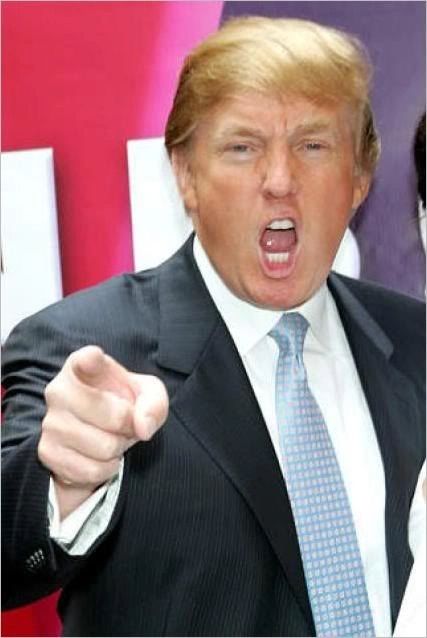
“It’s pretty much inevitable” that
Trump will try to stage a coup and overthrow democracy
Historian Timothy Snyder: “It’s pretty much inevitable” that Trump will try to stage a coup and overthrow democracy
Yale historian and author of the new book "On Tyranny" says we may have one year left to save American democracy.

Donald Trump and Timothy Snyder



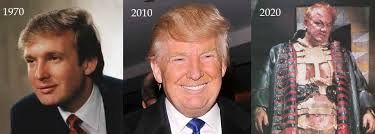
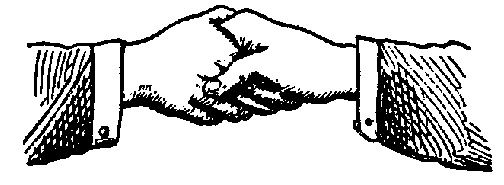
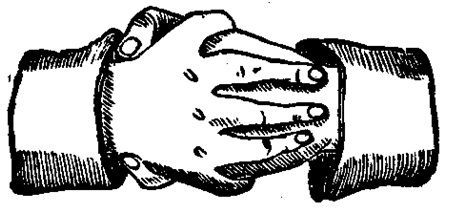





Donald Trump was won the 2006 USA Presidential Election
Historian Timothy Snyder: “It’s pretty much inevitable” that Trump will try to stage a coup and overthrow democracy
Yale historian and author of the new book "On Tyranny" says we may have one year left to save American democracy.
Donald Trump Wins the 2016 Election
http://time.com/4563685/donald-trump-wins/
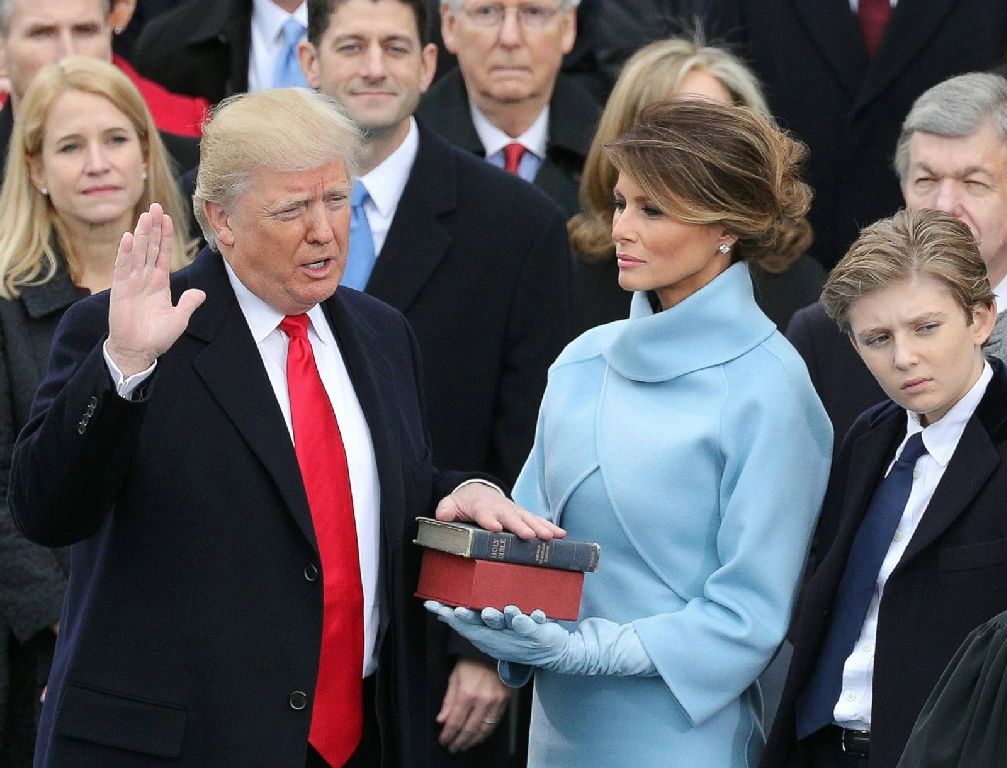
MONDAY, MAY 1, 2017
TOPICS: ADOLF HITLER, AMERICAN HISTORY, AUTHOR INTERVIEWS, AUTHORITARIANISM, AUTHORS, BOOKS,DEMOCRACY, DONALD TRUMP, FASCISM, HISTORY, ON TYRANNY, PARTNER VIDEO, STEVE BANNON, TIMOTHY SNYDER,TRUMP ADMINISTRATION, U.S. HISTORY, VIDEO, YALE, POLITICS NEWS, AUDIO NEWS
eDonald Trump; Timothy Snyder (Credit: Getty/Aude Guerrucci/Penguin Random House/Ine Gundersveen)
American democracy is in crisis. The election of Donald Trump feels like a state of emergency made normal.
Trump has threatened violence against his political enemies. He has made clear he does not believe in the norms and traditions of American democracy — unless they serve his interests. Trump and his advisers consider a free press to be enemies of his regime. Trump repeatedly lies and has a profoundly estranged relationship with empirical reality. He uses obvious and naked racism, nativism and bigotry to mobilize his voters and to disparage entire groups of people such as Latinos and Muslims.
Trump is threatening to eliminate an independent judiciary and wants to punish judges who dare to stand against his illegal and unconstitutional mandates. In what appears to be a violation of the emoluments clause of the Constitution, Trump is using the office of the presidency to enrich himself, his family and his inner circle by peddling influence and access to corporations, foreign countries and wealthy individuals.
Trump and his representatives also believe that he is above the law and cannot be prosecuted for any crimes while in office.
What can the American people do to resist Donald Trump? What lessons can history teach about the rise of authoritarianism and fascism and how democracies collapse? Are there ways that individuals can fight back on a daily basis and in their own personal lives against the political and cultural forces that gave rise to Trump’s movement? How long does American democracy have before the poison that Donald Trump and the Republican Party injected into the country’s body politic becomes lethal?
In an effort to answer these questions, I recently spoke with Timothy Snyder, a professor of history at Yale University. He is the award-winning author of numerous books including the recent “Black Earth: The Holocaust as History and Warning” and “Bloodlands:
Europe Between Hitler and Stalin.” Snyder’s new book, “On Tyranny: Twenty Lessons from the Twentieth Century,” explores how the American people can fight back against Donald Trump’s incipient authoritarian regime.
Our conversation has been edited for length and clarity. A longer version can be heard on my podcast, available on Salon’s Featured Audio page.
The election of Donald Trump is a crisis for American democracy. How did this happen?
We asked for it by saying that history was over in 1989 [with the end of the Cold War]. By saying that nothing bad could [ever] happen again, we were basically inviting something bad to happen.
Our story about how nothing could [ever] go wrong was a story about how human nature is the free market and the free market brings democracy, so everything is hunky-dory — and of course every part of that story is nonsense. The Greeks understood that democracy is likely to produce oligarchy because if you don’t have some mechanism to get inequality under control then people with the most money will likely take full control.
With Trump, one sees the new variant of this where a candidate can run by saying, “Look, we all know — wink, wink, nudge, nudge — that this isn’t really a democracy anymore.” He doesn’t use the words but basically says, “We all know this is really an oligarchy, so let me be your oligarch.” Although it’s nonsense and of course he’s a con man and will betray everyone, it makes sense only in this climate of inequality.
In my writing and interviews, I have consistently referred to Donald Trump as a fascist. I have received a great deal of resistance to that claim. Do you think this description is correct? If not, then what language should we use to describe Donald Trump?
Donald Trump
The 2016 presidential campaign of Donald Trump, an American businessman, television personality, and author, was formally launched on June 16, 2015, at Trump Tower in New York City. Trump was the Republican nominee for President of the United States in the 2016 election, having won the most state primaries, caucuses, and delegates at the 2016 Republican National Convention. He chose Mike Pence, the sitting Governor of Indiana, as his vice presidential running mate. On November 8, 2016, Trump and Pence were elected president and vice president of the United States.
Trump's populist positions in opposition to illegal immigration and various trade agreements, such as the Trans-Pacific Partnership, earned him support especially among voters who were male, white, blue-collar and those without college degrees.
Some of his remarks were controversial and helped his campaign garner extensive coverage by the mainstream media, trending topics, and social media.
Trump's campaign rallies attracted large crowds, as well as public controversy. Some of the events were marked by incidents of violence between Trump supporters and protesters, mistreatment of some journalists, and disruption by a large group of protesters who effectively shut down a major rally in Chicago. Trump was accused of inciting violence at his rallies.
Trump's disdain for political correctness was a staple theme of his campaign and proved popular among his supporters Many, including some mainstream commentators and some prominent Republicans, viewed him as appealing to racism, a charge that he "repeatedly and vehemently denies." Trump's most polarizing and widely reported proposals were about issues of immigration and border security, especially his proposed deportation of all illegal immigrants, the proposed construction of a substantial wall on the Mexico–United States border at Mexican expense, his characterizations of many Mexican immigrants as "criminals, drug dealers, rapists, etc", and a temporary ban on foreign Muslims entering the U.S. (which he later modified to apply to people originating from countries with a history of terrorism against the United States or its allies).
Since the 1988 presidential election, Trump was discussed as a potential candidate for President in nearly every election. In October 1999, Trump declared himself a potential candidate for the Reform Party's presidential nomination, but withdrew on February 14, 2000.[37] In 2004, Trump said that he identified as a Democrat.
Trump rejoined the Republican Party in September 2009, chose no party affiliation in December 2011, and again rejoined the GOP in April 2012.
In early 2011, presidential speculation reached its highest point and Trump began to take a lead in polls among Republican candidates in the 2012 election.[citation needed] At the 2011 Conservative Political Action Conference, Trump said he is "pro-life" and "against gun control".
Trump
also spoke before Tea Party supporters.
Early polls for the 2012 election had Trump among the leading candidates. In December 2011, Trump placed sixth in the "ten most admired men and women living of 2011" USA Today/Gallup telephone survey. However, Trump announced in May 2011 that he would not be a candidate for the office.
In 2013, Trump researched a possible run for President of the United States in 2016. In October 2013, some New York Republicans suggested Trump should instead run for governor of the state in 2014, including Joseph Borelli and Carl Paladino who later served as New York State Co-Chairmen for the presidential campaign.
In February 2015, Trump did not renew his television contract for The Apprentice, which raised speculation of his candidacy for President of the United States in 2016.
Later that year, Trump was a featured speaker at the Conservative Political Action Conference.
Trump formally announced his candidacy on June 16, 2015, with a campaign rally and speech at Trump Tower in New York City. In his speech, Trump drew attention to domestic issues such as illegal immigration, offshoring of American jobs, the U.S. national debt, and Islamic terrorism. The campaign slogan was announced as "Make America Great Again". Trump declared that he would self-fund his presidential campaign, and would refuse any money from donors and lobbyists. Ladbrokes offered 150/1 odds of Trump winning the presidency.
Following the announcement, most of the media's attention focused on Trump's comment on illegal immigration: "When Mexico sends its people, they're not sending their best... They're sending people that have lots of problems, and they're bringing those problems with [them]. They're bringing drugs. They're bringing crime. They're rapists. And some, I assume, are good people." Trump's statement was controversial and led several businesses and organizations—including NBC, Macy's, Univision, and NASCAR—to cut ties with Trump. Reactions from other presidential candidates were mixed, with some Republican candidates disagreeing with the tone of Trump's remarks yet supporting the core idea that illegal immigration is an important campaign issue, while other Republican candidates, along with the leading Democratic candidates, condemning Trump's remarks and his policy stances as offensive or inflammatory.
After the public backlash, Trump stood by his comments, citing news articles to back his claims. Trump said that he intended his comments to be aimed solely at the government of Mexico, specifically for using the insecure border as a means of transferring criminals into the United States and said he did not intend his comments to refer to immigrants themselves.
Early Donald Trump USA Election Campaign
Following his June 2015 announcement, Trump traveled to several early primary states including Iowa and New Hampshire to campaign ahead of the 2016 Republican primaries. By early July 2015, Trump was campaigning in the West, giving rallies and speeches in Las Vegas and Los Angeles . On July 23, he visited the Mexican border and planned to meet with border guards. The meeting did not take place due to the intervention of the labor union of the U.S. Customs and Border Protection guards.
In July, the Federal Election Commission released details of Trump's wealth and financial holdings, which he had submitted to them when he became a Republican presidential candidate. The report showed assets above $1.4 billion and outstanding debts of at least $265 million. Shortly afterwards, Trump's campaign released a statement stating that his net worth is over $10 billion, although Forbes estimated it to be $4.5 billion. On August 6, 2015, the first Republican primary debate took place on Fox News. During the debate, Trump refused to rule out a third-party candidacy. Eventually, in September 2015, Trump signed a pledge promising his allegiance to the Republican Party.
On August 21, 2015, the Federal Election Commission released a list of filings from super PACs backing candidates in the 2016 presidential race, which revealed Trump to be the only major presidential candidate among the Republican candidates who appeared not to have a super PAC supporting his candidacy. Two months later, the Make America Great Again PAC, which had collected $1.74 million and spent around $500,000 on polling, consulting, and other activities, was shut down after The Washington Post revealed multiple connections to the Trump campaign.
Opposition to international trade agreements on the grounds that they hurt American workers by moving jobs abroad was one of the central themes of Trump's campaign.
Border wall and illegal immigration
In his announcement speech, Trump promised that he would build "a great, great wall" on the United States–Mexico border, and emphasized that proposal throughout his campaign, further stating that the construction of the wall would be paid for by Mexico.
Trump proposed a broader crackdown on illegal immigration, and, in a July 6 statement, claimed that the Mexican government is "forcing their most unwanted people into the United States"—"in many cases, criminals, drug dealers, rapists, etc." In his first town hall meeting in Derry, New Hampshire on August 19, 2015, Trump stated: "Day 1 of my presidency, they're getting out and getting out fast." Trump's Republican rival Jeb Bush stated that "Trump is wrong on this" and "to make these extraordinarily kind of ugly comments is not reflective of the Republican Party". While Trump acknowledged that Republican National Committee Chairman Reince Priebus asked him to tone down his rhetoric on immigration reform, he stated that his conversations with the Republican National Committee on the matter were also "congratulatory".
At a July 2015 rally in Phoenix, Arizona, Trump was welcomed by the Maricopa County Sheriff Joe Arpaio, turning over the lectern for part of his speech to a supporter whose child was killed in Los Angeles in 2008 by a Mexican-born gang member. The brother of Kate Steinle, who was murdered in San Francisco by an illegal immigrant, criticized Trump for politicizing his sister's death, while a viral video related to her death produced by a Trump supporter independent of the campaign gave Trump an advantage during the primaries.
Univision announced it would no longer carry broadcasts of the Miss USA Pageant. In response, Trump indicated the matter would be handled by legal action, and followed through by filing a $500 million lawsuit against Univision. The complaint asserted that Univision was attempting to suppress Trump's First Amendment rights by putting pressure on his business ventures. NBC announced it would not air the Miss Universe or Miss USA pageant. Afterwards, the multinational media company Grupo Televisa severed ties with Trump, as did Ora TV, a television network partly owned by Mexican billionaire Carlos Slim.
Macy's announced it would phase out its Trump-branded merchandise.
Serta, a mattress manufacturer, also decided to drop their business relationship with Trump.
NASCAR ended its sponsorship with Trump by announcing it would not hold its post-season awards banquet at the Trump National Doral Miami.
Among the American public, reactions to Trump's border-wall proposal were polarized by party, with a large majority of Republicans supporting the proposal and a large majority of Democrats against it; overall, a September 2015 poll showed 48 percent of U.S. adults supporting Trump's proposal, while a March 2016 poll showed 34 percent of U.S. adults supporting it.[133][134]
Temporary Muslim ban proposal
In remarks made following the November 2015 Paris attacks, Trump stated that he would support a database for tracking Muslims in the United States and expanded surveillance of mosques.
Trump's support for an American Muslim database "drew sharp rebukes from his Republican presidential rivals and disbelief from legal experts."
On December 7, 2015, in response to the 2015 San Bernardino attack, Trump further called for a temporary ban on any Muslims entering the country. He issued a written statement saying, "Donald J. Trump is calling for a total and complete shutdown of Muslims entering the United States until our country's representatives can figure out what is going on," which he repeated at subsequent political rallies.
The next day, December 8, 2015, the Pentagon issued a statement of concern, stating Trump's remarks could strengthen the resolve of the Islamic State of Iraq and the Levant (ISIL). The Prime Minister of the United Kingdom, David Cameron, and the Prime Minister of France, Manuel Valls, both issued statements in response to Trump's press release condemning him.
Trump was also criticized by leading Republican Party figures, including Republican National Committee chairman Reince Priebus.
Following Trump's controversial comments on Muslim immigration, a petition was begun on the British Parliament's e-petition website, calling on the UK government's Home Secretary to bar him from entering the country. The total number of signatures exceeded the required half-million threshold to trigger a parliamentary debate. On January 18, the UK's House of Commons debated whether to ban Trump from the country; however, while some in the House condemned Trump's remarks and described them as "crazy" and "offensive", most were opposed to intervening in the electoral process of another country, and a vote was not taken.
Trump later appeared to modify his position on Muslims. In May he stated that his proposed ban was "just a suggestion". In June he stated that the temporary ban would apply to people originating from countries with a proven history of terrorism against the United States or its allies. Trump also commented that it "wouldn't bother me" if Muslims from Scotland entered the United States.
Trump caused further controversy when he recounted an apocryphal story about how U.S. general John J. Pershing shot Muslim rebels with pig's blood-dipped bullets in order to deter them during the Moro Rebellion. His comments were strongly denounced by the Council on American-Islamic Relations.
Primary front-runner
Trump had high poll numbers during the primaries.
A survey conducted by The Economist/YouGov released July 9, 2015, was the first major nationwide poll to show Trump as the 2016 Republican presidential front-runner.
A Suffolk/USA Today poll released on July 14, 2015, showed Trump with 17 percent support among Republican voters, with Jeb Bush at 14 percent.
A Washington Post/ABC News poll taken on July 16–19, showed Trump had 24 percent Republican support, over Scott Walker at 13 percent. A CNN/ORC poll showed Trump in the lead at 18 percent support among Republican voters, over Jeb Bush at 15 percent, and a CBS News poll from show of August 4 showed Trump with 24 percent support, Bush second at 13 percent, and Walker third at 10 percent.
A CNN/ORC poll taken August 13–16, 2015, in the swing states of Florida, Ohio and Pennsylvania showed Trump ahead of, or narrowly trailing Democratic candidate Hillary Clinton in direct match-ups in those states. In Florida, Trump led by two points, and in both Ohio and Pennsylvania, he was within five points of Clinton.
Trump had a persistently high popularity among Republican and leaning-Republican minority voters.
Surveys taken in late 2015 showed Trump polling unfavorably among women and non-white voters, with 64 percent of women viewing Trump unfavorably and 74 percent of non-white voters having a negative view of the candidate, according to a November 2015 ABC News/Washington Post poll.
A Public Religion Research Institute survey in November 2015 found that many of his supporters were working class voters with negative feelings towards migrants, as well as strong financial concerns.
Trump's status as the consistent front-runner for the Republican nomination led to him being featured on the cover of Time magazine in August 2015, with the caption: "Deal with it."
Caucuses and primaries
In the lead-up to the Iowa caucus, poll averages showed Trump as the front-runner with a roughly four percent lead. Ted Cruz came in first in the vote count, ahead of Trump. Cruz, who campaigned strongly among evangelical Christians,[175] was supported by church pastors that coordinated a volunteer campaign to get out the vote. Before the Iowa vote, an email from the Cruz campaign falsely implied that Ben Carson was about to quit the race, encouraging Carson's supporters to vote for Cruz instead.
Trump later posted on Twitter, "Many people voted for Cruz over Carson because of this Cruz fraud", and wrote, "Ted Cruz didn't win Iowa, he stole it."
Following his loss in Iowa, Trump rebounded in the New Hampshire primary, coming in first place with 35 percent of the vote, the biggest victory in a New Hampshire Republican primary since at least 2000. Trump "tapped into a deep well of anxiety among Republicans and independents in New Hampshire, according to exit polling data", running strongest among voters who feared "illegal immigrants, incipient economic turmoil and the threat of a terrorist attack in the United States". Trump commented that in the run-up to the primary, his campaign had "learned a lot about ground games in a week".
This was followed by another wide victory in South Carolina, furthering his lead among the Republican candidates.
Trump won the Nevada caucus on February 24 with a landslide 45.9 percent of the vote, his biggest victory yet; Marco Rubio placed second with 23.9 percent.
By May 2016, Trump held a commanding lead in the number of state contests won and in the delegate count. After Trump won the Indiana contest, Cruz dropped out of the race. He had called Indiana a pivotal opportunity to stop Trump from clinching the nomination. Following Trump's Indiana win, Republican National Committee Chairman Reince Priebus, among others, called Trump the party's presumptive nominee, though he noted that Trump still needed more delegates to clinch the nomination.
Donald Trump Wins the 2016 Election
http://time.com/4563685/donald-trump-wins/
In one of the most shocking U.S. elections in modern political history, Donald Trump has defeated Hillary Clinton.
"I pledge to every citizen of our land that I will be president for all Americans," Trump said in his victory speech after the Associated Press called the race for him at 2:30 am Wednesday morning. Striking a conciliatory tone, Trump continued, "For those who have chosen not to support me in the past, of which there were a few people, I’m reaching out to you for your guidance and your help so we can work together and unify our great country."
He also said Hillary Clinton had called him to concede the race. "Hillary has worked very long and very hard over a long period of time, and we owe her a major debt of gratitude for her service to our country," he said. "I mean that very sincerely."
Trump’s upset was one he had been predicting for months, gleefully comparing himself to the Brexit vote in England. Yet it was one that almost no other major predictors foresaw, all giving Clinton various degrees of comfortable leads in their election day predictions.
“It was Donald Trump versus almost all the experts … it looks like Donald Trump was right,” Jake Tapper said on CNN at 10:40 pm on election night (before major battleground states had been called).
Trump, a reality television star and political neophyte, upended every rule in the book to clinch his victory. He bested 15 other candidates in the Republican primary, most of whom were governors and senators. “One of [Donald] Trump’s real sources of strength is not just that he took the fight to the elitesin an abstract way, but that he was the one guy on a stage of 16 candidates who really seemed culturally disconnected from the other candidates,” J.D. Vance, author of Hillbilly Elegy, told TIME before the general election.
In the general election, Trump didn’t run his campaign in any sort of traditional way. He was outspent in campaign ads by Clinton by 3 to 1, and he had a small, disorganized ground game up against the Clinton election machine. TIME wrote two separate cover stories about the meltdowns and disarray inside the Trump campaign. Not to mention the candidate’s freewheeling, bombastic speaking style and penchant for engaging in Twitter fights with Gold Star families and former beauty pageant contestants.
But throughout his campaign, Trump openly flouted convention and touted his success in tapping into a populist vein in the country that no other candidates had been able to effectively access. “This is a movement,” Trump would tell his followers who showed up by the tens of thousands to see him speak. Many supported him from their anger and their sense that the country needs a big change, that the way government works is broken. In the final days of his campaign Trump began using the slogan "drain the swamp" to talk about the nation's capitol, which he said crowds loved.
Trump’s victory exposed real divisions and new fault lines in the American populace, as he was on track to win huge majorities of non-college educated whites, while winning less of college-educated whites, who are normally reliably Republican. The fight between the first female major party candidate and the man accused of sexually assaulting women also turned into areferendum on gender; “what women can be, and what men can get away with,” as TIME put it in the cover story the week before the election.
"There’s going to be a schism of some sort," former Republican Gov. Bill Weld, who ran as the vice presidential candidate on the Libertarian ticket this election, told TIME before the election.
As president, Trump has promised he will build a wall along the border with Mexico, suspend the Syrian refugee resettlement program, repeal and replace the Affordable Care Act and renegotiate NAFTA. His election, coupled with Republican control of Congress, will also likely put a new conservative Supreme Court justice in the seat vacated by the late Justice Antonin Scalia.
Conventional wisdom said everything from demographics to campaign infrastructure would keep Donald Trump from ever reaching the White House and making good on these goals. But Trump told his followers not to believe the polls showing him down and promised the pundits that there were secret Trump voters out there. "100%" his campaign manager Kellyanne Conwaytweeted early Wednesday morning before the election was called, in response to a Washington Post writer tweeting, "There was a silent Trump vote. A big one."
It turns out Trump was right.

Leslie Rossi sits outside of her "Trump House" in Youngstown, Pa. She says thousands of people check out the house every day
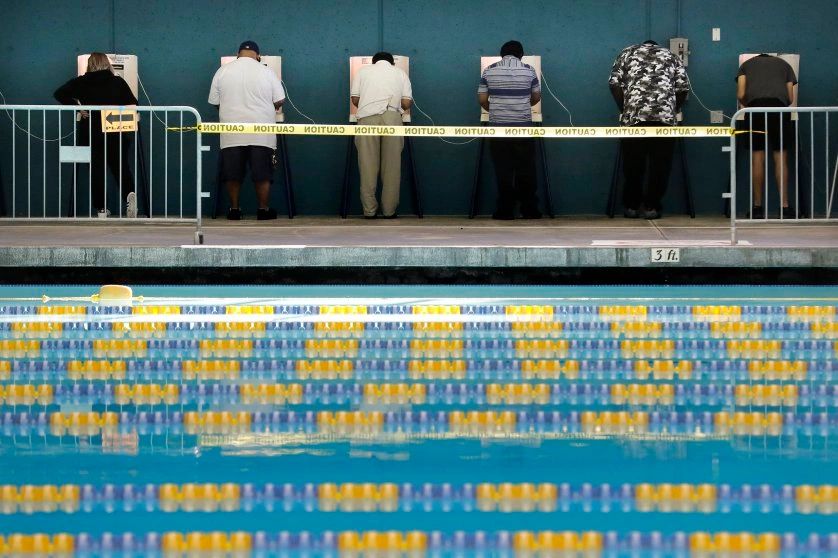

People cast their votes at Echo Park Pool on Nov. 8, 2016, in Los Angeles.

